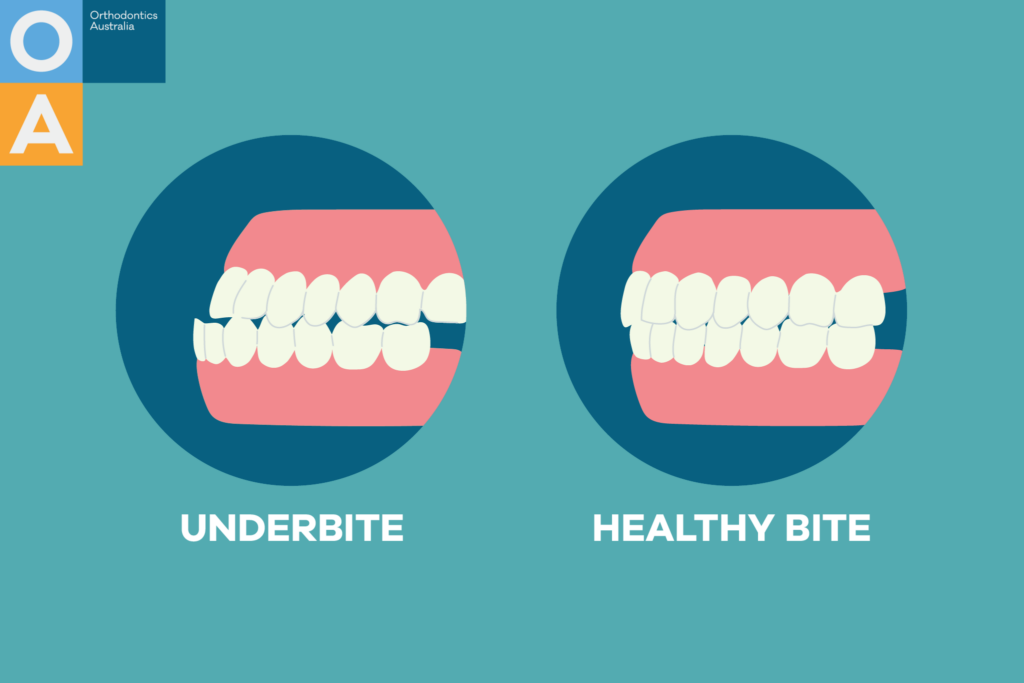Having a great smile can boost your confidence and significantly improve your quality of life. Unfortunately, not everyone is born with a perfect smile. In fact, there are some dental conditions that can affect your jaw and teeth’s alignment, which in turn can affect your self-esteem about your smile.
One of these dental conditions is an underbite, which can be remedied through the correct orthodontic treatment. In this article, we explore the different reasons why you might have an underbite and how you can treat them for the perfect smile long-term.
What is an underbite?
In its simplest form, an underbite is when your jaw is misaligned and causes the lower teeth to protrude beyond the upper teeth. Also known as a Class III malocclusion or ‘reverse-bite’, underbites are quite rare. They range in severity from mild cases that are almost unnoticeable, to severe cases where the lower jaw extends out far beyond the upper jaw.

What causes an underbite?
There are many different causes of an underbite. The primary cause is genetics, as most people inherit their underbite from their family. In general, DNA tends to affect your teeth and jaw, and this includes any misalignments such as an underbite. However, if you’ve inherited an underbite than preventing it is not possible – but treating it is possible.
Another cause of an underbite is through an injury of some kind. If you’ve been in an accident and sustained injuries to the face, there could be long-lasting damage to the jaw. While you might be able to surgically repair broken jaws bones, your teeth might not be properly aligned post-procedure, which can lead to a potential underbite.
Lastly, tumours to the mouth or jaw are an incredibly uncommon cause of an underbite, as the tumour would affect the growth and alignment of the jaw.
What are the risks of an underbite?
While you can live a regular life with a mild underbite, severe cases can often lead to more serious oral health problems further down the track. Not treating a serious underbite can cause speech, biting and chewing difficulties, as well as pain and discomfort in your mouth and jaw.
Some underbites can even damage tooth enamel, increasing the likelihood of chipped or broken front teeth. You might also be at risk of bad breath (halitosis in dental terms) as it can cause bacterial infections to develop in the mouth.
Luckily, orthodontics can treat underbites with great results. This is often without the need for surgery, but your orthodontist will let you know if surgery is required for your treatment.
Can wisdom teeth cause underbite?
Despite what a lot of people may think, wisdom teeth aren’t the cause for many dental problems, including underbites. While underbites may get worse with adolescent growth and later teenage growth, which lines up with when wisdom teeth would erupt, the two issues aren’t associated with each other at all.
What age should you check and fix an underbite?
The sooner you (or your child) see an orthodontist, the better. Orthodontic treatment for an underbite should start in childhood, while the jaw bones are still malleable and may be more easily coerced into alignment. Early diagnosis with a specialist orthodontist can provide the appropriate information and best advice to manage an underbite problem.

Do children outgrow underbites?
Unfortunately, children do not outgrow underbites. As underbites are usually inherited, it’s unlikely that when a child’s adult teeth come through, the underbite will disappear.
The appearance of an underbite may worsen during puberty, particularly during any growth spurts. This means that the underbite can become larger, with the lower jaw and chin appearing more protrusive and the profile becoming more concave. This is why we recommend seeking early treatment as certain cases can be successfully intercepted.
Can braces fix an underbite?
Braces or clear aligners can be an effective method of treatment for an underbite, particularly for milder cases. An orthodontist can provide an accurate diagnosis and then determine the relevant treatment options available for your individual needs. The severity of the diagnosed underbite will influence the treatment recommendations. This is why it is important to see a specialist orthodontist, as an inaccurate diagnosis often leads to incomplete or ineffective treatment.
How can you fix an underbite?
Treatment methods depend on the age of the patient and the severity of their underbite. In most cases, however, mild to moderate underbites can be fixed without surgery. The most common methods to correct an underbite include:
- An upper jaw expander may be recommended if the upper jaw is also small in width. Fitted across the patient’s palate, the upper jaw expander works by gradually widening the jaw so that the lower teeth match better with the upper teeth.
- The ‘reverse-pull’ headgear can be used to pull the upper jaw forward and works more effectively for patients under the age of 10.
- Braces or clear aligners, such as Invisalign®, Spark® and 3M Clarity, can be an effective treatment method for underbite for both adults and children, especially if orthodontic elastics are also worn.
- Tooth extraction involves carefully extracting selected teeth, where appropriate, to help correct underbite in mild to moderate cases.
- Surgery may be required if adults have a severe underbite and want to properly align the upper and lower jaws into their ideal positions. The surgery is generally very predictable and is considered low risk. When appropriate, a referral to a maxillofacial surgeon will be provided by your specialist orthodontist.
The key to correctly and effectively managing underbites is an early diagnosis by a knowledgeable specialist orthodontist. If you think you or your child has an underbite, then use the Finder Tool to find your nearest orthodontist and request a booking consultation today.










